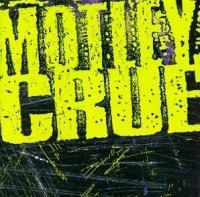
MÖTLEY CRÜE
Mötley Crüe
![]()
Elektra (1994)
Rating: 7/10

|
I never saw it coming – one of my favourite metal bands of all time emerging from the shadows of the crusty grunge invasion without Vince Neil. For me, Vince had always been the archetype hair metal front man – the looks, the voice, the lifestyle – but Mötley Crüe circa 1994 was a different metallic beast, a serious, heavyweight dinosaur keen to impose itself on the current music scene.
Fronting the band was journeyman John Corabi, one of metal’s most underrated frontman, a chap who never seemed to hit the big time with his big voice and so maybe, just maybe, Crüe was the horse he needed to ride.
Sadly, a majority of the fans couldn’t deal with a Crüe bereft of blonde bombshell Vince and the album was poorly received. Despite hitting the Billboard at #7 it didn’t sell well and critics believed that Crüe’s time was finally up.
However, years later I’m looking at this record from a new perspective, hoping to separate it from other Crüe albums rather than compare it, which in the 90s so many people did. Maybe the band should have gone under a different name, because although there are a few Crüe trademarks here, particularly Mick Mars’ riffs, this is very much a different sound.
Mötley Crüe is a dense, dark and formidable record, bereft of thrills and spills it almost labours from the speakers. Corabi’s vocals are mighty, masculine in their venom, and there’s no denying his soul, but time and time again I hear myself saying, “but is it Crüe?”, and of course I have to say “no”.
Album opener ‘Power To The Music’ chugs in on an unremarkable riff. Corabi is a top notch vocalist, but there’s nothing here that grabs you. Sadder still, this five-minute opener already takes a quicksand hold and I’m gagging by the time it’s out. Second track is the moody ‘Uncle Jack’ with its cutting grunge-tinged riff. Tommy Lee’s drums pound but again, like everything else on this record, there’s no sparkle.
Mötley Crüe 1994 is a band attempting to fit into the scheme of things, and I never thought Crüe would find it necessary to follow trends. Third track, ‘Hooligan’s Holiday’, is more boisterous, the band still finding the need to drag these songs out. The riffs are ponderous, Corabi’s choppy raps, despite being bold and bolshie, fail to find any identity amidst the dense riffs which clog up proceedings, drowning Nikki Sixx’s bass in the process.
There is something gargantuan about the whole concept of this record. Again, it seems aware of the trends, but we’re offered a respite with the magnificent ‘Misunderstood’, which I still think is one of Crüe’s greatest ever songs. The track wisps in on a Beatles ‘Dear Prudence’ (from 1968’s The Beatles) style vibe, swirling and swaying as a psychedelic ballad given a spine with the strings and Lee’s solid drum. It boasts a cracking soulful chorus but comes into its own just over two minutes in with that chainsaw riff. It’s my favourite track on the album, dropping colour into the muddy textures.
‘Loveshine’ is equally uplifting; it has a strong rootsy feel, wafting in on the breeze with its shuffling acoustic and this is where Corabi really comes to the fore. There’s no way these songs would have suited Vince Neil, but then these are two different vocalists. Corabi’s meaty approach is able to drag itself out of the thick smog, where Vince would have been swallowed within minutes.
‘Poison Apples’ keeps up the quality, a short and sweet rocker featuring a bouncy piano and real glam rock sleaze edge. It’s just a shame the band revert back to that quagmire time and time again. ‘Til Death Do Us Part’ mesmerizes at first, then spirals into a cumbersome oath of as track, as is the trippy ‘Welcome To The Numb’.
There’s no real variation here, with the band all too keen to create grunge-tinged episodes that clatter along like a treacle train. That’s not to say that this isn’t a decent record, but under the Crüe moniker is just doesn’t work. It’s certainly less messy than 1997’s Generation Swine, but a track like ‘Dropping Like Flies’, with its Alice In Chains-style swoon, pretty much sums up this gluey opus.
I’ve seen and heard constant comments from people saying how John Corabi is a stronger vocalist than Vince Neil, and that can’t be argued, but of all the Mötley Crüe albums this is probably the most dated in the sense that it is clearly trying to fit in with the grunge style of sludge. Many will disagree and say this is the band’s best opus, but I’ll always respond the same and ask, “but is it Crüe?”, and put simply, it’s not. And so it’s time to end this review before it becomes as laborious as the record.
Neil Arnold





